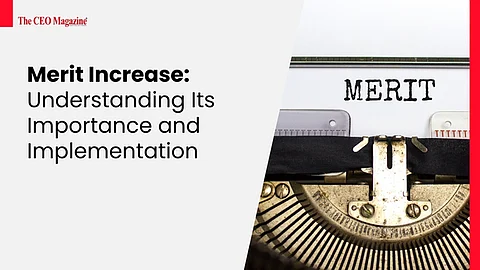
- News
- Women
- Magazine
- IndustryIndustry
- InsightsInsights
- Success Stories
- PublishPublish
- ContactContact
- Media KitMedia Kit

Merit Increase: Understanding Its Importance and Implementation
In today’s competitive job market, organizations constantly seek ways to attract and retain top talent. One of the most effective strategies to achieve this is through merit increases—salary raises awarded based on an employee’s performance and contributions. This article explores the significance of merit increases, how they can be implemented effectively, and their impact on employee motivation and organizational success.
A merit increase refers to an adjustment in an employee’s salary that reflects their performance level. Unlike standard cost-of-living adjustments, which are often applied uniformly across the board, merit increases are differentiated based on individual performance assessments. Typically awarded during annual reviews, these increases recognize outstanding contributions, encouraging employees to excel in their roles.
Employee Motivation and Engagement: Merit increases serve as a powerful motivator, instilling a sense of appreciation in employees. When team members see that their hard work and dedication are recognized financially, they are more likely to remain engaged and committed to their roles.
Attracting Top Talent: A competitive compensation package that includes merit increases can attract high-caliber candidates. Prospective employees are more inclined to join organizations that reward exceptional performance, positioning the company as a desirable workplace.
Retention of High Performers: Retaining top talent is crucial for any organization. Merit increases can help reduce turnover rates by ensuring that high performers feel valued. When employees are rewarded for their contributions, they are less likely to seek opportunities elsewhere.
Fostering a Performance Culture: Implementing a merit increase system fosters a culture of performance within an organization. Employees are encouraged to set and achieve goals, driving overall productivity and innovation.
Establish Clear Performance Metrics: Organizations must define specific, measurable performance metrics that align with their goals. These metrics provide a clear framework for evaluating employee performance and determining eligibility for merit increases.
Conduct Regular Performance Reviews: Regular performance evaluations allow managers to assess employee contributions consistently. These reviews should be structured and involve both qualitative and quantitative feedback, offering a comprehensive view of an employee’s performance.
Communicate Clearly: Transparency is vital in any merit increase program. Employees should understand the criteria for merit increases and how their performance will be assessed. Open communication fosters trust and encourages employees to seek feedback on their performance.
Consider External Market Trends: Organizations should stay informed about industry salary trends to ensure that their merit increase offerings remain competitive. This awareness helps retain talent and positions the organization as a leader in its sector.
Ensure Fairness and Equity: A fair merit increase process is crucial to maintaining morale and trust within the organization. Evaluations should be free from bias, and organizations must strive to provide equitable raises based on performance rather than favoritism.
Merit increases have a direct correlation with an organization’s success. By effectively implementing a merit increase program, companies can enhance employee satisfaction, foster a high-performance culture, and ultimately drive profitability. When employees feel valued and rewarded for their efforts, they are more likely to contribute positively to the organization’s goals.
In conclusion, merit increases are a critical component of an effective compensation strategy. By recognizing and rewarding outstanding performance, organizations can motivate employees, attract top talent, and foster a culture of excellence. As businesses navigate an increasingly competitive landscape, implementing a robust merit increase program can be a decisive factor in achieving long-term success.
Follow us on Google News
